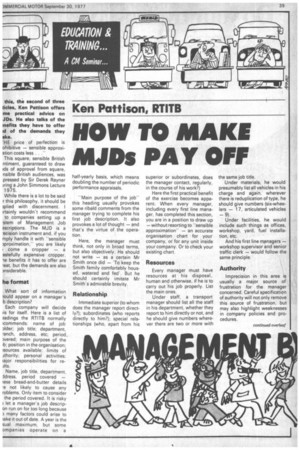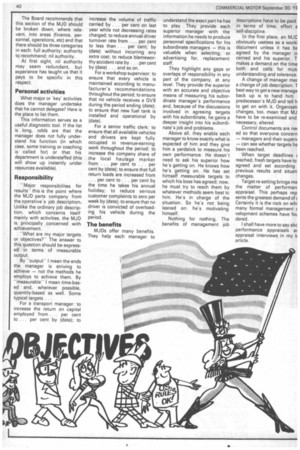Ken Pattison, RTITB
Page 41

Page 42

If you've noticed an error in this article please click here to report it so we can fix it.
NOW TO MAKE AtilDs PAY OFF
this, the second of three tides, Ken Pattison offers me practical advice on .113s. He also talks of the mafits they have to offer id of the demands they ake.
'HE price of perfection is ohibitive — sensible approxiation costs less This square, sensible British ntiment, guaranteed to draw ids of approval from square, nsible British audiences, was pressed by Sir Derek Rayner iring a John Simmons Lecture 1975.
While there is a lot to be said r this philosophy, it should be )plied with discernment, I !rtainly wouldn't recommend
to companies setting up a stem of Management Job ascriptions. The MJD is a -ecision instrument and, if you mply handle it with "sensible )proximation," you are likely ! come a cropper — a astefully expensive cropper. le benefits it has to offer are -eat, but the demands are also )nsiderable.
he format
What sort of information lould appear on a manager's b description?
Each company will decide
is for itself. Here is a list of .adings the RTITB normally !commends. name of job alder; job title; department, -anch, address, etc; period, )vered; main purpose of the lb; position in the organisation; !sources available; limits of ithority, personal activities; iajor responsibilities for reAlts.
Name, job title, department, Jdress, period covered —
iese bread-and-butter details -e not likely to cause any
roblems. Only item to consider the period covered. It is risky ) let a manager's job descrip on run on for too long because ) many factors could arise to lake it out of date. A year is the suai maximum, but some ompanies operate on a half-yearly basis, which means doubling the number of periodic performance appraisals.
"Main purpose of the job" this heading usually provokes some ribald comments from the manager trying to complete his first job description. It also provokes a lot of thought — and that's the virtue of the operation.
Here, the manager must think, not only in broad terms, but also objectively. He should not write — as a certain Mr Smith once did — 'To keep the Smith family comfortably housed, watered and fed'. But he should certainly imitate Mr Smith's admirable brevity.
Relationship
Immediate superior (to whom does the manager report directly?); subordinates (who reports directly to him?); special relationships (who, apart from his superior or subordinates, does the manager contact, regularly, in the course of his work?) Here the first practical benefit of the exercise becomes apparent. When every manager, including every first line manager, has completed this section, you are in a position to draw up — without resorting to "sensible approximation" — an accurate organisation chart for your company, or for any unit inside your company. Or to check your existing chart.
Resources
Every manager must have resources at his disposal, human and otherwise, if he is to carry out his job properly. List the main ones.
Under staff, a transport manager should list all the staff in his department, whether they report to him directly or not, and he should give numbers wherever there are two or more with the same job title.
Under materials, he would presumably list all vehicles in his charge and again, wherever there is reduplication of type, he should give numbers (six-wheelers — 17, articulated vehicles — 9).
Under facilities, he would include such things as offices, workshop, yard, fuel installation, etc.
And his first line managers — workshop supervisor and senior traffic clerk — would follow the same principle.
Authority
Imprecision in this area is usually a major source of frustration for the manager concerned. Careful specification of authority will not only remove this source of frustration, but may also highlight weaknesses in company policies and procedures. The Board recommends that this section of the MJD should be broken down, where relevant, into areas (finance, personnel, operations, etc) and that there should be three categories in each: full authority; authority to recommend; nil authority.
At first sight, nil authority may seem redundant, but experience has taught us that it pays to be specific in this respect.
Personal activities
What major or 'key' activities does the manager undertake that he cannot delegate? Here is the place to list them.
This information serves as a useful diagnostic tool. If the list is long, odds are that the manager does not fully understand his function (in which case, some training or coaching is called for) or that his department is understaffed (this will show up instantly under resources available).
Responsibility
"Major responsibilites for results" this is the point where the MJD parts company from the operative's job descriptions Unlike the ordinary job description, which concerns itself mainly with activities, the MJD is principally concerned with achievement.
"What are my major targets or objectives?" The answer to this question should be expressed in terms of measurable output.
By "output" I mean the ends the manager is striving to achieve — not the methods he employs to achieve them. By "measurable" I mean time-based and, wherever possible, quantity-based as well. Some typical targets . .
For a transport manager: to increase the return on capital employed from . . . per cent to . . . per cent by (date); to increase the volume of traffic carried by • . . per cent on last year while not decreasing rates charged; to reduce annual driver turnover rate from . . . per cent to less than . . . per cent; by (date) without incurring any extra cost; to reduce blameworthy accident rate by . . . per cent by (date) . . . and so on.
For a workshop supervisor: to ensure that every vehicle is maintained according to manufacturer's recommendations throughout the period; to ensure that no vehicle receives a GV9 during the period ending (date); to ensure that new fuel tank is installed and operational by (date).
For a senior traffic clerk: to ensure that all available vehicles and drivers are kept fully occupied in revenue-earning work throughout the period; to increase the company share of the local haulage market from . . . per cent to . . . per cent by (date); to ensure that full return loads are increased from . . . per cent to . . . per cent by the time he takes his annual holiday; to reduce serious customer complaints to zero per week by (date); to ensure that no driver is convicted of overloading his vehicle during the period.
The benefits
MJDs offer many benefits. They help each manager to understand the exact part he has to play. They provide each superior manager with the information he needs to produce personnel specifications for his subordinate managers — this is valuable when selecting, or advertising for, replacement staff.
They highlight any gaps or overlaps of responsibility in any part of the company, at any level. They provide the superior with an accurate and objective means of measuring his subordinate manager's performance and, because of the discussions involved in agreeing targets with his subordinate, he gains a deeper insight into his subordinate's job and problems.
Above all, they enable each manager to know exactly what is expected of him and they give him a yardstick to measure his own performance. He doesn't need to ask his superior how he's getting on. He knows how he's getting on. He has set himself measurable targets to which his boss has agreed; now, he must try to reach them by whatever methods seem best tc him. He's in charge of the situation. So he's not being leaned on: he's motivating himself.
Nothing for nothing. The benefits of management job descriptions have to be paid in terms of time, effort a self-discipline.
In the first place, an MJC obviously useless as a -worki document unless it has bE agreed by the manager cc cerned and his superior. T makes a demand on the time both and calls for mutt understanding and tolerance.
A change of manager meE a change of job description. T best way to get a new manage back up is to hand him predecessor's MJD and tell h to get on with it. Organisati changes, too, mean that MJ have to be re-examined and. necessary, altered.
Control documents are net ed so that everyone concern — managers and their superit — can see whether targets ha been reached.
When target deadlines E reached, fresh targets have to agreed and set according previous results and situati changes.
Target re-setting brings me the matter of performan appraisal. This perhaps rep sents the greatest demand of Certainly it is the rock on whi many formal management c velopment schemes have fot. dered.
I shall have more to say abc performance appraisals at appraisal interviews in my k article_






































































































